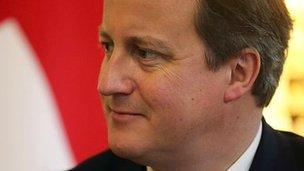David Cameron welcomes family-friendly internet filters
- Published

David Cameron said the announcements on internet safety were "big progress"
Family-friendly filters to help parents protect their children from seeing pornographic images on the internet have been welcomed by David Cameron.
Speaking to Radio 4's Woman's Hour, the prime minister said the filters were important to stop children "stumbling across hardcore legal pornography".
It comes a week after internet service providers said the filters could be turned on to block access.
Mr Cameron said work was being done to stop paedophiles accessing images.
On Monday, Google and Microsoft announced that 100,000 search terms would now return no results that could find illegal material.
Mr Cameron told the programme that he did not agree with Jim Gamble, the former head of the Child Exploitation and Online Protection Centre (Ceop), who said this would not have a big impact as paedophiles did not use search websites to find these images, but instead go to the "dark corners of the internet on peer-to-peer websites".
He said search engines had already been blocking inappropriate content and the latest move was just an enhancement of what was already happening.
Mr Gamble said a better solution would be to spend Ā£1.5m on hiring 12 child protection experts and 12 co-ordinators in each of the police regions to hunt down online predators.
But Mr Cameron said: "You've got people who are dabbling in this, experimenting in this, and who are using the open internet and they won't get search returns, so it stops their revolting journey as it were.
"Secondly, there is evidence that paedophiles have used the open internet to search for terms and to get results."
He said Ceop helped come up with the list of search terms which are now banned.
"Is the job done? Of course it isn't. Do we need to go after the dark 'net? Of course we do. But no-one should deny this is big progress," he said.
'Revolting' images
Mr Cameron said GCHQ were helping the National Crime Agency (NCA) to find people who use the "dark net" - stand-alone networks that sit separate to the web but are accessible to those that run the right software.
"One of the things that came out of the meeting that gave me hope was that actually when people talk about these sites on the dark web where people are sharing revolting images, one of the experts said it's not totally dissimilar to people downloading movies and music.
"There are some quite big sites where a lot of work happens, a lot of disgusting work happens, so if you can get after those big sites, you can deal with quite a lot of the problem."
He added: "Child abuse is something tragically that happens in every country in every society and is far too prevalent.
"I'm not making this argument about the internet to try and distract from the problems of child abuse in society, I'm just saying, 'look, things that are illegal offline need to be illegal online'."
Mr Cameron also said that Sky, Virgin, BT and TalkTalk - who control most of the market - had all agreed to make the family-friendly filters available to all households.
"I've talked to parents who've had very direct experience of this happening, where the children were looking for something totally legitimate but ended up with, you know, some pretty horrible things in front of them and so this is a problem and that's why this whole issue of filters and filters for the internet are so important."
Woman's Hour is broadcast on “óĻó“«Ć½ Radio 4 on Saturday 23 November at 16:00 GMT and can be listened to again on iplayer.
- Published18 November 2013
- Published16 November 2013
- Published22 July 2013
- Published22 July 2013
- Published21 July 2013
- Published18 June 2013
- Published17 June 2013
- Published15 July 2013
- Published31 May 2013